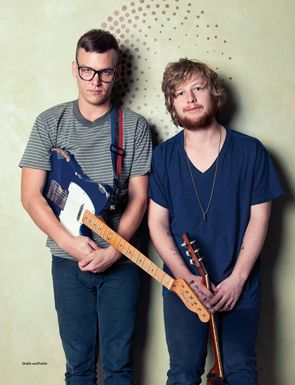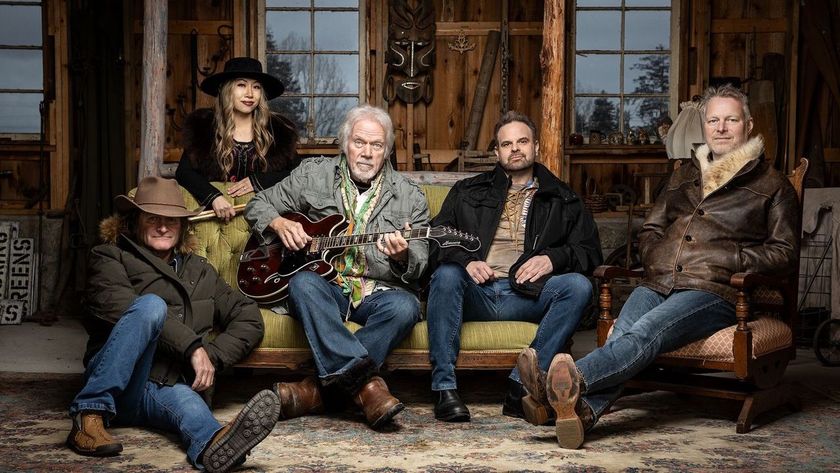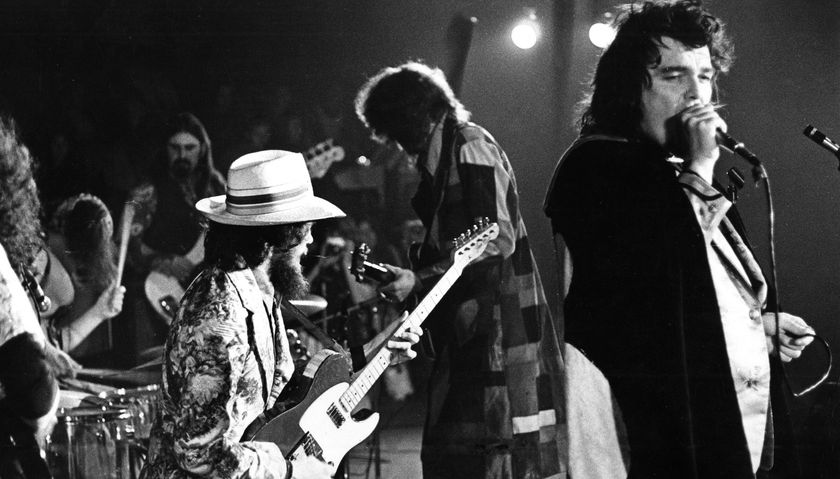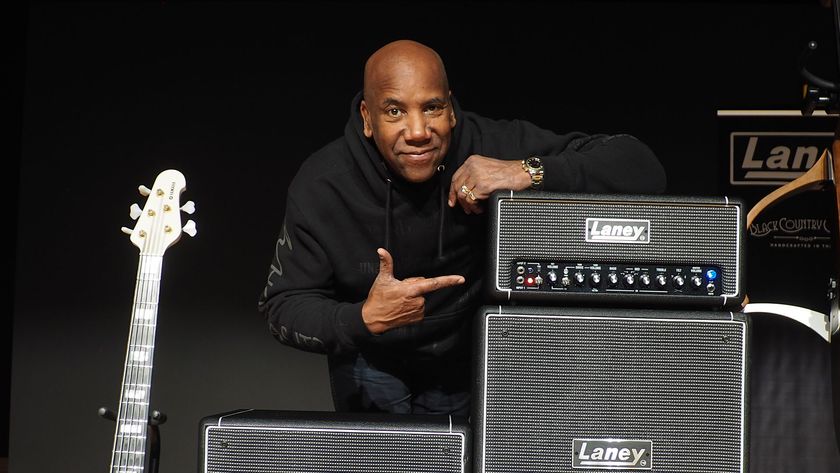Cage the Elephant On New Album 'Thank You Happy Birthday'

Originally published in Guitar World, February 2011
Cage the Elephant make a stomping big noise on Thank You Happy Birthday.
Thank You Happy Birthday, the new album by Cage the Elephant, is a nonstop sonic joyride through jungles of wild guitar tones. An air of mystery pervades the disc. Guitars materialize out of nowhere, then vaporize into oblivion. Blasts of alt-rock grunge give way to passages of reverberating film-noir Duane Eddy twang. The song “Japanese Buffalo” starts off as a 6/8 waltz, shifts into a hardcore blitz and resolves into a romantic Fifties ballad progression.
“As a band, we kind of have musical ADD,” guitarist Brad Shultz says, laughing. “But somehow it all seems focused.”
A lot of that focus comes from solid songwriting, plus inventive yet grounded production courtesy of the band’s longtime producer, and de facto sixth member, Jay Joyce.
“We never want to write or record the same album twice,” adds guitarist Lincoln Parish. “We never want to get stuck in the same type of sound.”
Cage the Elephant have certainly traveled a long way, musically and geographically, since they first came together in 2006 and released their self-titled debut album in 2007. The band originated in Bowling Green, Kentucky, where listening to rock music was a clandestine activity for Shultz and his brother Matt, who is Cage the Elephant’s singer.
Get The Pick Newsletter
All the latest guitar news, interviews, lessons, reviews, deals and more, direct to your inbox!
“Our parents were very religious,” Brad says, “and when Matt and I were young, our dad wouldn’t let us listen to much secular music. The only secular music we were allowed to listen to was stuff like the Beach Boys and Tommy James and the Shondells. Once in a while my dad might throw in some Joe Cocker. But I had to sneak to listen to a tape of Jimi Hendrix’s Are You Experienced. I’d fall asleep listening to it and my dad would catch me with the tape. He kept tapes like that in a crate in his room. Me and Matt would break in there so often that he started putting a little piece of thread near the bottom of the door jamb. If we walked through the doorway, we’d trip the thread and he’d know we’d been in there.”
The Shultz brothers are 17 months apart. Brad is the elder. “But I don’t think you’ll see any bittersweet sibling rivalry between us,” he says. “We grew up in pretty close confines. Our parents didn’t have a lot of money. We had four kids in our family, and there was one year where my dad made, like, 6,000 bucks. So we were all in one room, all four brothers. You basically had to walk across our bed to get in and out of the room. So Matt and I are close. We’re close with all our brothers.”
Despite their family’s financial challenges and religious reservations regarding rock and roll, the brothers nevertheless managed to launch a series of high school rock bands, enlisting the aid of drummer Jared Champion. After high school, they got more serious about it. Another friend, Daniel Tichenor proved handy on bass. The last member of Cage the Elephant to fall into place was Parish, who was just 15 when he joined the guys after contacting them via MySpace.
“His mom actually dropped him off at the first band practice,” Shultz recalls. “It was so funny, like something out of the movie Almost Famous. She’s like, ‘I just know Lincoln’s going to be so good for your band. I promise you.’ He was the typical 15-year-old kid, like, ‘Aw, Mom, be quiet.’ But once he started playing, we were like, ‘My God!’ ”
Although a relatively small city of some 50,000 people, Bowling Green proved a nurturing environment for Cage the Elephant during their formative stages.“What makes Bowling Green so cool and unique is there’s not really a music scene to cater to,” Shultz says. “There’s no one style of music that’s really fashionable. There’s just a bunch of musicians. We all kind of hang out together and support one another, even though we’re all playing very different types of music.”
But in 2007, the band signed with U.K. label Relentless Records and decided to move to London. “It was the one record deal that gave us full creative control,” Shultz says. “It seemed enticing to move over there, because several bands that we looked up to had gone to London, broke there and then came back to the States. Going to London seemed like a good idea at the time. We were young.”
“I was probably stupid to want to move to London when I was 17,” Parish says in retrospect. “We had this whole vision in our heads that we were going to go over there and become rock stars overnight. It totally didn’t work out that way. For the first several months there, we were playing to two people a night. One night we just played to a bartender and our tour agent. But after a year it really started to take off. The last tour we did over there was a headline tour, and we played to crowds anywhere between 1,000 and 2,500 people.”
Nor were they quartered in any of London’s hippest districts. “We were living in Leighton in far east London,” Parish says. “It was a shithole. The label’s idea was to put us out of central London and Camden because they thought we were going to be partying too much. So they got us a house way out there. But we found a store, Tesco, that’s kind of the English version of Walmart, and they sold alcohol 24 hours a day. We still managed to get people to come all the way out to our house and party.”
More importantly than booze, Cage the Elephant began to soak up a wide range of new musical influences. Friends introduced them to current U.K. groups like Foals as well as classics from the early Eighties post-punk era such as Gang of Four. “Especially their album Entertainment,” Shultz says. It’s definitely in my top-10 albums of all time. Gang of Four’s guitar player, Andy Gill, is one of my favorites and probably had one of the greatest influences on me as a guitar player.”
“We got into Eighties stuff like the Jam, the Fall and Wreckless Eric,” Parish adds. “And not only just English bands but also bands that were well respected in England, like the Pixies, the Replacements and Sonic Youth.”
The result was a major broadening of the band’s musical horizons in the period between its first album and Thank You Happy Birthday. “On the first CD, we were a band that had hardly ever played outside of Bowling Green, Kentucky,” Shultz says. “I think we had a really formulated idea of what pure and honest music was, because we hadn’t been exposed to a lot of music. But we moved over to London and started listening to a lot of stuff. It was almost like we were afraid to grow, as silly as that sounds. We just had this whole big ‘What is Cage the Elephant?’ moment. And then we started realizing that Cage the Elephant is whatever we write. We stopped trying to write in any specific style.”
The band was bristling with new songs and new ideas when it returned to the States and holed up in Nashville’s Tragedy/Tragedy recording studio to make Thank You Happy Birthday. Shultz and Parish constitute an ideal guitar team for bringing those ideas to life. Shultz is more of a Fender guy, favoring Telecasters and Jazzmasters through a Fender Super-Sonic amp, whereas Parish relies heavily on a “Goldtop” Les Paul, which he played through everything from an Orange amp to a blackface Bassman head to an old “Plexi” Marshall belonging to Joyce. The producer also brought in vintage gear, like a Sixties Gretsch Country Gentleman that was used for the slide guitar on “Japanese Buffalo,” and a Washburn 12-string that Parish overdubbed four or five times on the album’s first single, “Shake Me Down.”
Parish tends to conceive of guitar parts in visual terms. “I got the inspiration for the low-string twang part in ‘Indy Kidz’ thinking about Jack the Ripper creeping around the streets of London,” he says. “I may be a weirdo for thinking like that, but it seems to work.”
Shultz, for his part, cites everything from Fifties guitar duo Santo & Johnny to R&B vocal group the Coasters as influences on the album. On a more contemporary note, many of the album’s mysterious clouds of backward guitar noise were created with a Boomerang III Phrase Sampler pedal. “I’d like to do a whole song backward one day,” Shultz says. “All except for drums and bass.”
Shultz also has an Electro-Harmonix HOG pedal in his board. Both players make ample use of Big Muffs, Memory Man pedals and all the other usual suspects. Parish gets some edgy chorus tones out of his DigiTech Whammy Pedal. “I’ve played with a lot of pedals pretty much since I joined the band,” he says. “Brad used to not play with pedals at all. But look at him now!”
As Cage the Elephant head out on the road to support Thank You Happy Birthday, their plan for the future is simple: “Keep moving forward, keep progressing,” Parish says. “One day I’d like to make a total noiserock album,” Shultz muses. “Like the Butthole Surfers or something.”

"The BTO sound is BACK!!" Bachman-Turner Overdrive release first new material in over 25 years – and it features a Neil Young guitar solo

“He would beat the crap out of the guitar. The result can best be described as Jackson Pollock trying to play like John Lee Hooker”: Aggressively bizarre, Captain Beefheart's Trout Mask Replica remains one of the craziest guitar-driven albums ever made










